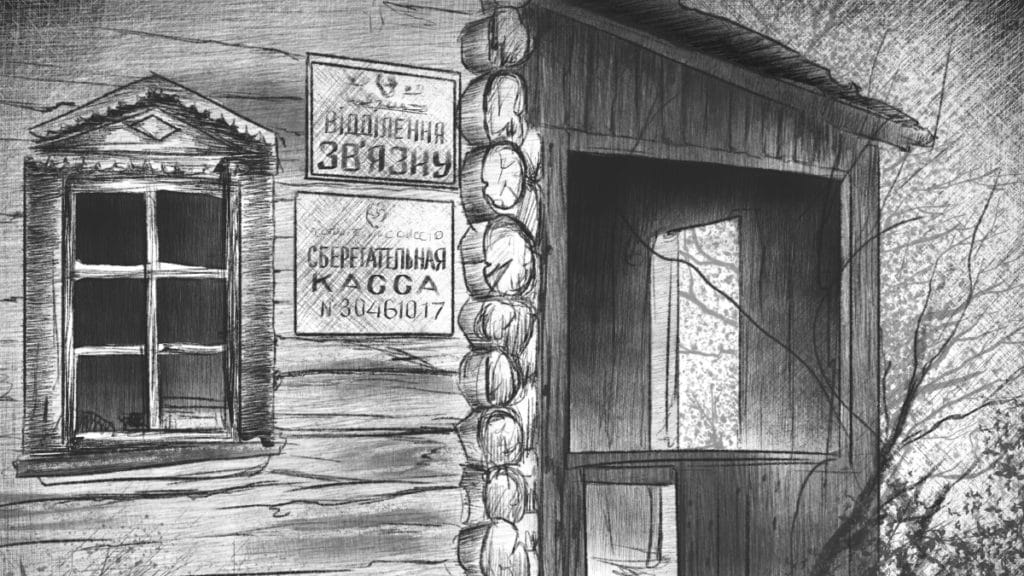
If you look at the roads leading from Chernobyl to Kiev in autumn from a bird’s eye view, they seem to be thin silver threads wriggling between the crimson gaps of autumn forests and fields.
If the road is being studied, standing on its side of the road, a smooth, densely watered with smudges of engine oil, multi-kilometer asphalt highway would be before the eyes. It is from such a very close distance that the military unit, which is commanded by the captain of the Soviet Army V.Y.Murzin, monitors the quality of the road surface.
The sanitary treatment point located after the village of Demidovo, at the very intersection of the auxiliary transport arteries with the main one leading to the capital of our republic, performs a special task.
More than sixty pieces of equipment are thoroughly decontaminated and washed here. These cars, the so-called “defaulters”, who managed to wind road dust with various radioactive particles on their loaded wheels. Captain Murzin’s unit is vigilantly ensuring that after total decontamination of such equipment, the level of its radioactive contamination does not exceed sanitary standards.
Valery Yuryevich answers questions of our correspondents thoughtfully, methodically and patiently explaining the specifics of the unit. He explains that there are services that deal only with the detection, identification and sorting of cars, tractors, graders, with an increased radiation background. But this is not the task of his unit.
The special service of the control road post is quite successfully involved in this. But they, like the specialists of the traffic service, have a task of a different scale. The level of contamination of the road surface has significantly decreased over the past couple of months. But all the same, those cars that managed to visit the dysfunctional sections of the territory of the 30-kilometer exclusion zone, one way or another, always get to them – to the MSPS site.
We will not talk in detail about the technological subtleties of chemical processes that allow you to quickly, and most importantly, process equipment in a high-quality manner. However, we note that highly effective preparations that are absolutely harmless to human health and significant volumes of specially prepared water are used for the decontamination of machines and mechanisms here.
And now, a car with the inscription “Bread” cautiously drove into the washing overpass. A military driver, Junior Sergeant Y. Yurchenko, is at the wheel.
“I have no idea,” the guy smiles a little embarrassedly, “where did I get the radiation so? I have to hurry, I’m taking bread. My unit is a mil-trade store, now it is located in a 30-kilometer zone, lunch is coming soon, but I’m stuck here”.
Captain Murzin, reassuring the junior sergeant, offers our correspondent to track the time on the clock. He assures that the car will be able to hit the road again in less than twenty minutes.
The fact that the assumption of the head of the Military Special Processing Station (MSPS) is right is easy to verify by observing the clearly tuned actions of the soldiers-deactivators. They wield heavy spray guns and brushes with special nozzles without fuss and with some virtuosity. Junior sergeant Vladimir Ketsik, privates Sergey Seregin and Agali Ataev, realizing that their commander is following their work, are trying hard.
Indeed, in the seventeenth minute from the moment the breadmaker entered the washing station, Junior Sergeant V. Ketsik already reports that the sanitation has been completed and the machine can continue to move. Captain Murzin squinted and smiled at the newspaper correspondent – well, but what I said, it took less than twenty minutes, we have everything exactly as in a pharmacy. These guys serve under my supervision for no more than a year, and they have already mastered their profession perfectly.
Then, together with the unit commander, we go to huge reservoirs by which waste water flows through a special pipeline. Murzin says that this “dirty water”, after special sludge and decontamination, will be used to treat the road surface on the section of the road from Chernobyl to Demidov.
In environmental terms, this attitude to water is most rational. Captain Murzin explains: “Thus, we save water, as a resut, we do not include new volumes of water in the continuous technological cycle, and we do not squander expensive chemical preparations. Engineers, designers, technologists, chemists, seconded to MSPS from the Leninsky Kuznitsa Kiev plant, help to develop a new solution and fine-tune water intake equipment”.
Together with Murzin’s unit, they all work in three shifts and live in the field. The captain claims that if there weren’t such competent specialists near the military, they would have been more difficult. All the guys from the factory are initiative and able to think. In a word, help arrived in time.
Toward the end of the meeting between our newspaper correspondent and Captain Murzin’s unit, a big tonnage heavy trucker, KamAZ, a “rare guest”, has recently arrived at the checkpoint.
The nameplate on the windshield is “ to process MSPS”. The captain’s smiling and slightly tired eyes become anxious for a second. He commands his children to urgently take up work. We can cope with such a giant – we are not the first time. I am glad that such equipment on the roads is less and less.
We press each other’s hand with the captain, and each goes to his combat post.